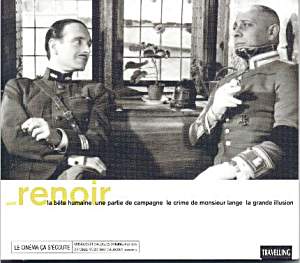Compilation:
Music for the films of Jean Renoir:
Joseph KOSMA - La bête humaine; Une partie de campagne; La grande illusion ; Jean WEINER – Le crime de Monsieur Lange
TRAVELLING NAIVE K1613 [54:36]

My general remarks about the understanding of French dialogue in relation to the other CDs in this Travelling Naïve French Classic Film Score series apply here. Certainly these Renoir films are all considered classics of the cinema and their screenplays will be familiar.
La Bête humain (1938) had a grey sombre score to match the tragic story set amongst working class railwaymen of romantic betrayal, rage, suicide and murder. Kosma's main title music is grim and powerfully dramtic. Train sound effects mix with rhythms that echo the cross-rhythms of trains crossing tracks. In contrast there is a little light-hearted pastoral and folk dance material and music that speaks of romance and pathos but generally it is heavily emotional and symbolic.
Joseph Kosma was an émigré from Budapest arriving in Paris in 1935. Renoir was looking for a popular song to use in his film Le crime de Monsieur Lange. Weiner introduced him to Renoir and Kosma came up with 'A la belle étoile' which is included with excerpts from Jean Weiner's score on this album. Kosma's creation is a sentimental café song one would have heard in the boulevard cafés of the period. Much of Weiner's music has a darker hue. It begins with street/fairground music from an organ grinder and trumpet and cymbals – all sounding sour and despairing. Then there is music of defiance and revolution as workers struggle against an oppressive boss. The final track is joyful triumphant popular dance.
Kosma went on to score other films for Renoir. His music for Renoir's masterpiece La grande illusion (the only French film on the list of the 'twelve best films in the world' drawn up in 1958) is a sardonic look at war with a heavily ironic march and derisory saxophone figures. Music hall songs and Viennese waltzes again with a world-weary and soiled tinge complete these score excerpts and a very Gallic version of It's a long way to Tipperary'.
Kosma's third score on this album is for a gentle, almost innocent, romance of a one-day-passion that lives, regretfully, in the minds of the illicit lovers – Une partie de campagne. The Main Title is rather tumultuous and passionate; though but most of the music is gently sentimental with waltzes and dances full of outdoors charm and gaiety and, occasionally, material of regret and turmoil – all very much in the accustomed French tradition.
A nice souvenir for the admirers of Jean Renoir's films. Otherwise a qualified recommendation.
Ian Lace

Return to Index